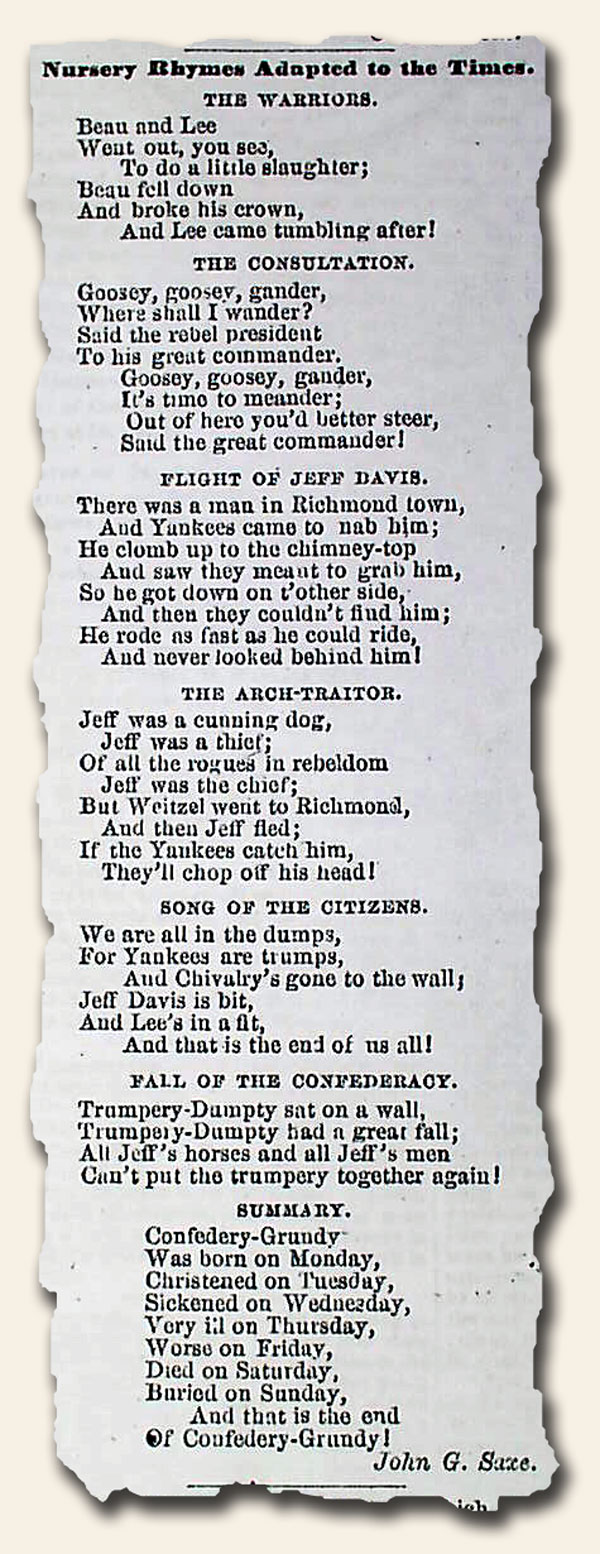They put it in print – Walt Whitman did not appreciate contemporary poetry…
October 18, 2018 by GuyHeilenman · Leave a Comment
During an interview in 1887, Walt Whitman stated he did not appreciate contemporary poetry, with one exception. How do we know? They put it in print in the Harper’s Weekly dated April 23, 1887: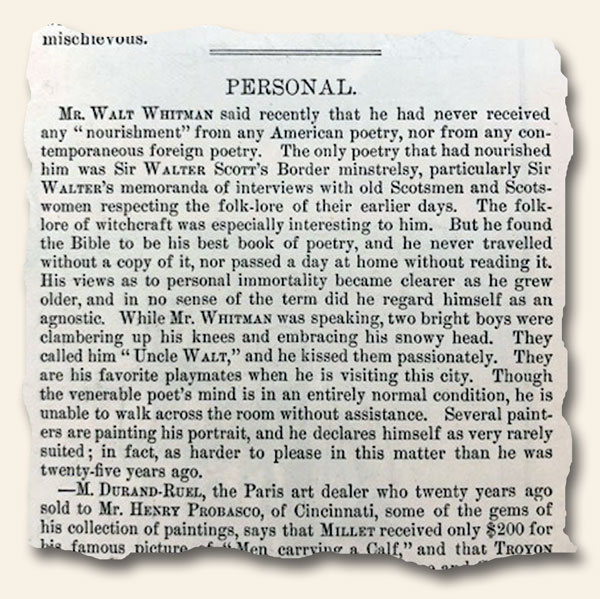
Snapshot 1863… same-year review of “Les Misérables”…
July 19, 2018 by GuyHeilenman · Leave a Comment
The following snapshot comes from The Atlantic Monthly, July, 1863…
I absolutely love this hobby! Ivanhoe…
April 29, 2017 by GuyHeilenman · Leave a Comment
One of the greatest pleasures of the Rare & Early Newspapers collectible is finding unexpected hidden gems as we peruse our issues. I use the word “unexpected” because, unlike searching for treasure, many of the most noteworthy discoveries are those found “along the way” – not items for which we were hunting. Such is the case with our most recent find: One of the first-ever reviews of Ivanhoe, by Sir Walter Scott. The front page of the Rhode-Island American dated March 3, 1820 has a review which gives a glimpse into how this 1820’s classic was received during its first year of publication.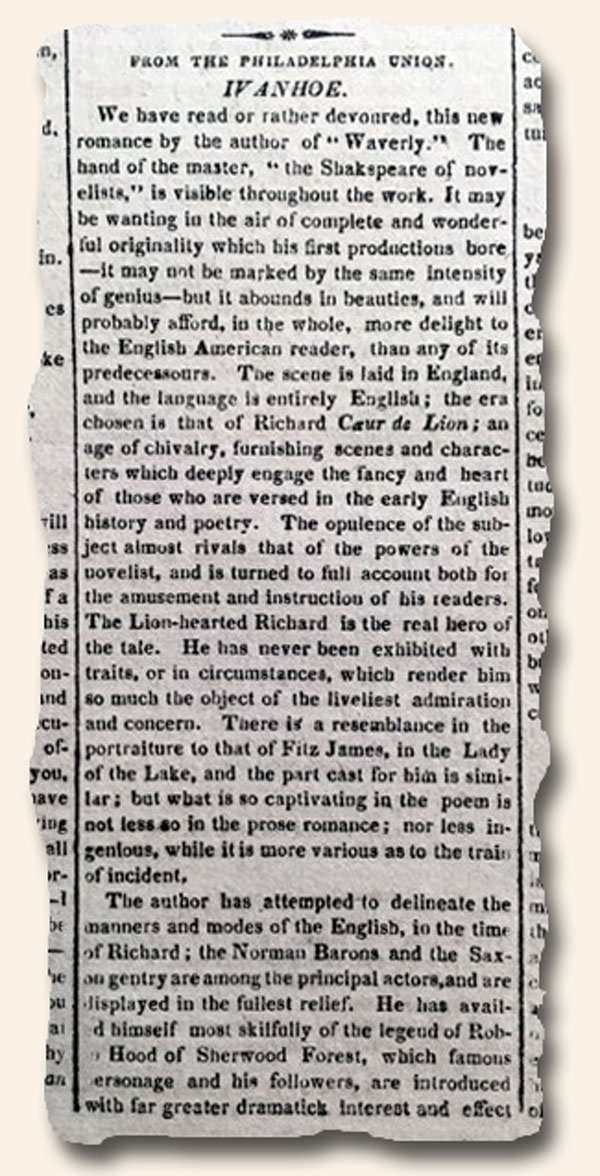
To read the entire review, go to: Ivanhoe, by Sir Walter Scott
The slippery slope of deteriorating morality… a reminder from 1929…
February 27, 2017 by GuyHeilenman · Leave a Comment
Through much of time certain behaviors have been universally accepted as immoral – the exploitation of women (in particular) through pornography being among them. However, perhaps it’s my age showing, but when did “Since legislating morality rarely changes behavior, let’s eliminate such legislation” become the modus operandi? As a former teacher I knew some of my students would likely cheat, but I still had rules and consequences regarding cheating. As a parent I understood my children might decide that hitting one another was a good way of handling disputes, but I still taught proper means of dealing with conflict and used my parental platform to legislate against hostile behavior. The recent (albeit well intended?) legalization of child prostitution in California in order to “protect” them from the consequences of being caught just doesn’t seem to make sense, and continues our slide down the slippery slope of immorality. I could be a bit off, but my gut tells me something is horribly wrong.
It is with these thoughts in mind I was struck by the front page of The Reform Bulletin from March 1, 1929 (see below), which focused on an effort in the State of New York to pull back on the decade old legalization of “obscene literature.” What’s “obscene literature”? Should morality be legislated, and if so, who makes the call as to which behaviors are moral and which are not? Should government take a role in the personal affairs of its citizens? Has the government overreached in this area in the past? While the answers to these questions and similar are quite complex, I think most would agree we’re not headed in the right direction – and the consequences are guaranteed to be non-partisan.
The Traveler… “…I could see no promise in him…”
December 5, 2016 by The Traveler · Leave a Comment
Today I traveled to New York City by the means of Harper’s New Monthly Magazine dated December, 1866. I found the first appearance of Mark Twain in a national magazine with the publishing of “Forty-Three Days in an Open Boat. Compiled From Personal Diaries.”
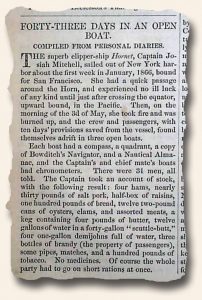 I also found through the Harper’s Monthly website the following information. “Mark Twain’s first article in Harper’s was miss-attributed to Mark Swain. The story, “Forty-three Days in an Open Boat” (December 1866), is an account of the Hornet, a clipper ship that caught fire in the ocean, leaving its crew adrift. Twain referred to it as the “first magazine article I ever published,” though he had published numerous pieces in other periodicals and newspapers under such names as Thomas Jefferson Snodgrass; W. Epaminondas Adrastus Blab; Rambler; Grumbler; and Peter Pencilcase’s Son, John Snooks.
I also found through the Harper’s Monthly website the following information. “Mark Twain’s first article in Harper’s was miss-attributed to Mark Swain. The story, “Forty-three Days in an Open Boat” (December 1866), is an account of the Hornet, a clipper ship that caught fire in the ocean, leaving its crew adrift. Twain referred to it as the “first magazine article I ever published,” though he had published numerous pieces in other periodicals and newspapers under such names as Thomas Jefferson Snodgrass; W. Epaminondas Adrastus Blab; Rambler; Grumbler; and Peter Pencilcase’s Son, John Snooks.
Mark Twain was born thirty-one years earlier, and two months premature, as Samuel Langhorne Clemens, in Florida, Missouri. “When I first saw him I could see no promise in him,” his mother said. The Clemenses moved several miles upstate, to the Missouri River-side Hannibal, when he was four; the town would later inspire the fictional St. Petersburg of his two most famous works, The Adventures of Tom Sawyer (1876) and The Adventures of Huckleberry Finn (1885)…”.
Twain didn’t turn out too bad after-all!
~The Traveler
A broken heart… 200+ years ago… today?
February 27, 2015 by GuyHeilenman · Leave a Comment
Anguish… deep sorrow… pain and emptiness that engulf and suffocate… As the saying goes: “The more things change, the more they stay the same.” No matter how far we advance as a race over time, the death of a loved one elicits the same paralyzing emotions today as it did 100… 1000… 5,000 years ago, and will continue to do so as long as humanity walks this earth. Such is the case (in spades) with a parent’s crushed spirit upon the loss of a child. While searching through an original printing of The American Magazine, Philadelphia, dated May, 1792 in the hopes of finding historical content, I came across the printing of a letter from a Father who was trying to come to terms with the untimely loss of his child. Language usage and expression aside, this letter written 200+ years ago could easily have been written yesterday. It also made me thankful for a hope beyond the grave – a hope that shouts from a Father’s pen as he attempts to express his heart… his love… his hope: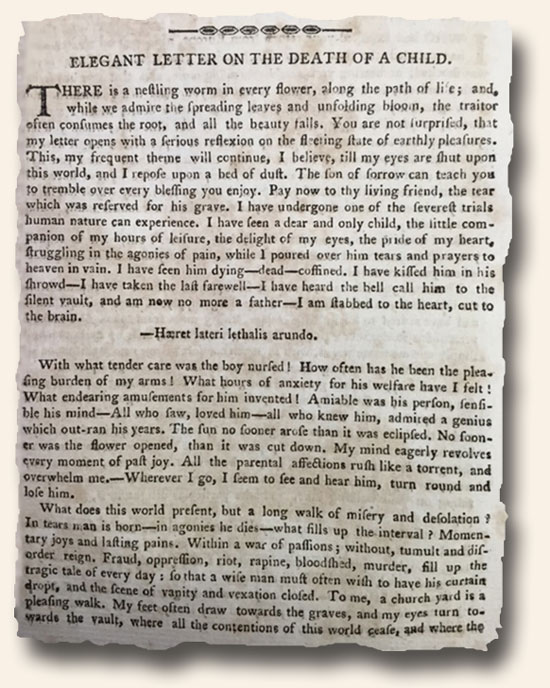
I’m thankful for… Abraham Lincoln…
November 26, 2014 by GuyHeilenman · Leave a Comment
As Thanksgiving rapidly approaches, one is compelled by the overwhelming blessings so many of us experience on a daily basis to consider things for which we are thankful, but often overlook. One such gratitude-producing individual for me is Abraham Lincoln. Was he a perfect man? No. Have many of his flaws been white-washed from history? Yes (I’m counting on the same treatment). However, this does not negate the truth that in my eyes, he was a man for “such a time” as his was. I’ve always appreciated his writing (whether it be from his own pen or another’s makes no difference to me). One of my favorites is:
“I do the very best I know how – the very best I can; and I mean to keep doing so until the end. If the end brings me out all right, then what is said against me won’t matter. If the end brings me out wrong, then ten Angles swearing I was right would make no difference at all.” Abraham Lincoln
We should all have such strength of conviction in regards to our actions under fire.
A short time ago I came across a letter from him which was printed in a National Intelligencer dated January 27, 1865 that may rival the above. It is his response to a letter received from him from Eliza Gurney, the wife of a recently departed friend. The full text is viewable via the image shown below, with the transcribed text to follow.
Executive Mansion,
Washington, September 4, 1864.
Eliza P. Gurney.
My esteemed friend.
I have not forgotten–probably never shall forget–the very impressive occasion when yourself and friends visited me on a Sabbath forenoon two years ago. Nor has your kind letter, written nearly a year later, ever been forgotten. In all, it has been your purpose to strengthen my reliance on God. I am much indebted to the good Christian people of the country for their constant prayers and consolations; and to no one of them, more than to yourself. The purposes of the Almighty are perfect, and must prevail, though we erring mortals may fail to accurately perceive them in advance. We hoped for a happy termination of this terrible war long before this; but God knows best, and has ruled otherwise. We shall yet acknowledge His wisdom and our own error therein. Meanwhile we must work earnestly in the best light He gives us, trusting that so working still conduces to the great ends He ordains. Surely He intends some great good to follow this mighty convulsion, which no mortal could make, and no mortal could stay.
Your people–the Friends–have had, and are having, a very great trial. On principle, and faith, opposed to both war and oppression, they can only practically oppose oppression by war. In this hard dilemma, some have chosen one horn, and some the other. For those appealing to me on conscientious grounds, I have done, and shall do, the best I could and can, in my own conscience, under my oath to the law. That you believe this I doubt not; and believing it, I shall still receive, for our country and myself, your earnest prayers to our Father in heaven.
Your sincere friend,
A. Lincoln.
So, what are you thankful for?
“All the News That’s Fit to Print”… one editor gets it right…
September 5, 2014 by GuyHeilenman · Leave a Comment
While the remainder of the newspaper seems to overwhelming contradict an editorial comment made by a contributor for the Southern Sentinel (Louisiana) in the issue of October 24, 1863, one can certainly appreciate his honest approach to reporting. I dare to say this could not be printed in most current-day newspapers with any degree of integrity. Please enjoy:
“Nursery Rhymes” on the Civil War…
November 12, 2011 by TimHughes · Leave a Comment
Parody songs are not uncommon on the airwaves today, particularly around Christmas time. Apparently adapting words to fit an existing tune–or poem–is nothing new as this May 17, 1865 issue of “The Springfield Daily Republican” shows (see below). These were certainly not the high-water mark of the varied Union responses to the end of the war: